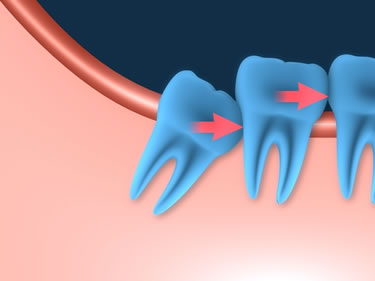Wisdom teeth are also known as third molars.
Unlike the other molars, which come in usually by age twelve, wisdom teeth come in sometime between the ages of 17 and 25.
Approximately 85 percent of people need to have their wisdom teeth extracted during their lifetime.
The reason they are nicknamed “wisdom teeth” is because they come in at an age where you are supposed to be older and wiser.
Although getting your wisdom teeth out may not sound like a lot of fun, it is a pretty routine procedure, especially if you have it done in your late teens or early twenties.
What Are the Main Reasons to Get Your Wisdom Teeth Removed?
They Are Impacted

Teeth become impacted when you don’t have enough room in your mouth for them. They get stuck in either your jaw bone or your gums, which can lead to pain and infection.
Infection
When a wisdom tooth is impacted in the gums, often food or bacteria can get caught in the area. This can cause a painful infection. (Know as pericoronitis)
Coming in Crooked
A wisdom tooth may come all the way in, but not be aligned well with the molar next to it. If it comes in sideways, it can damage nearby teeth.
Cysts
A cyst (fluid filled sac) can form in the soft tissue surrounding an impacted wisdom tooth. Although rare, these cysts can lead to more serious condition, including damage to the jaw and teeth.
Easier to Get Wisdom Teeth Removed When You Are Young
Wisdom teeth are definitely easier to remove when the patient is younger, because their roots are not fully formed.
Many teens get them out between the ages of 15 to 18, when the tissue is soft and flexible.
Having wisdom teeth extracted after the age of 35 can pose higher risks for complications and longer healing times.
If your wisdom teeth are not causing any problems, your dentist may recommend a wait and see approach.
Just keep your six month cleaning and exam appointments to stay on top of it.
What To Expect When Getting Your Wisdom Teeth Out?
There are several ways to make sure you don’t experience pain during the procedure. Most of the time, local anesthesia is all you will need.
We have other ways to insure you are totally at ease, including oral sedation, nitrous oxide (laughing gas), or intravenous sedation.
If you have sedation other than local, you should not plan to drive yourself to/from your appointment.
If the teeth are not impacted and there is no infection, the procedure doesn’t usually take long. (15 to 30 minutes to remove all four wisdom teeth)
Wisdom teeth that are impacted in either the bone or gums will take longer. Recovery time will be a bit longer as well.
After Care
Avoid drinking from straws and brush gently. Eat soft foods for the first 24 hours or longer, depending on how well your mouth is healing.
Read more in detail about how to care for yourself after a tooth extraction in our blog What To Do After Having A Tooth Pulled?
If you experience fever, severe pain or severe bleeding, contact our office immediately.
Dry Socket
You may have heard about having a dry socket. This is when the blood clot that formed after the extraction comes out.
Exposure to air on that area can make it very painful.
You can learn more about a dry socket and what to do for it by reading our blog, What Is A Dry Socket?
Schedule Your Appointment Now
Contact us now if you need to have your wisdom teeth removed.
